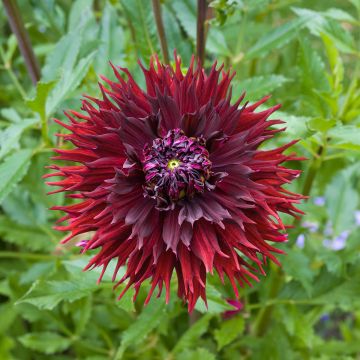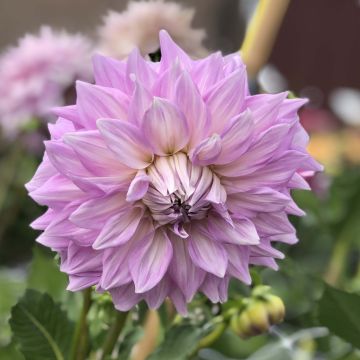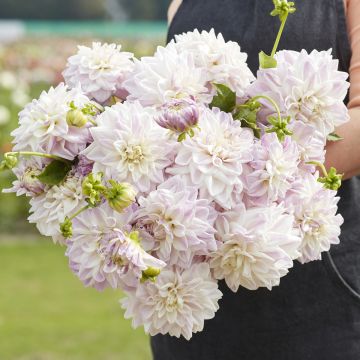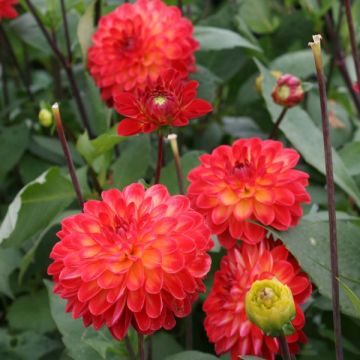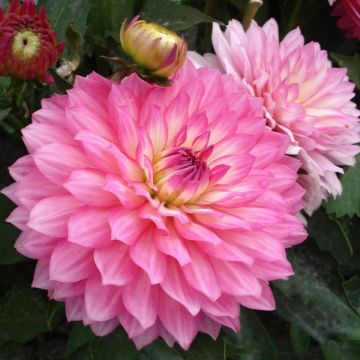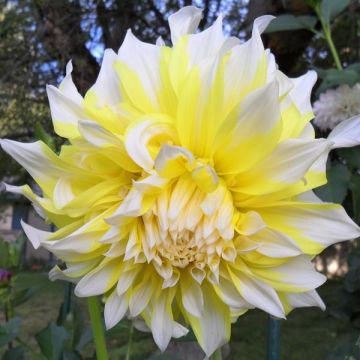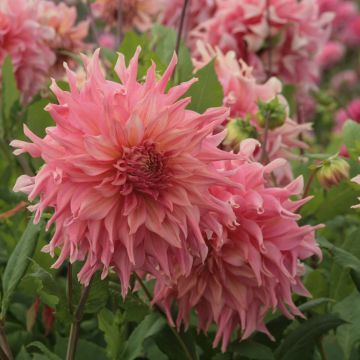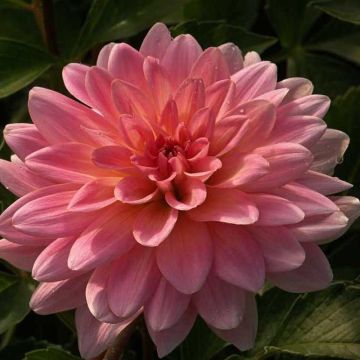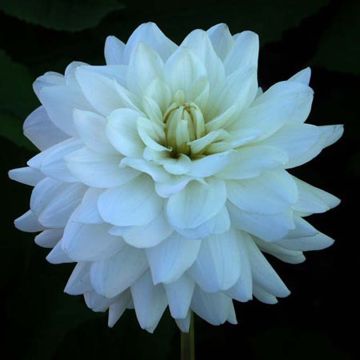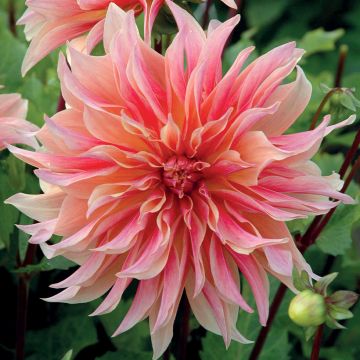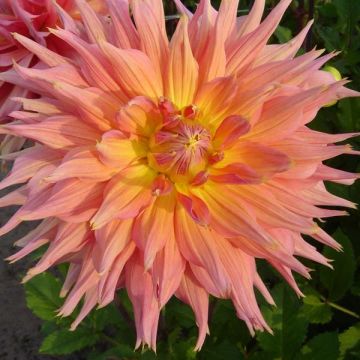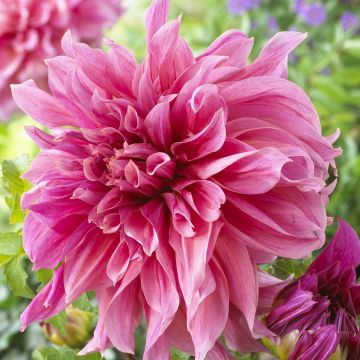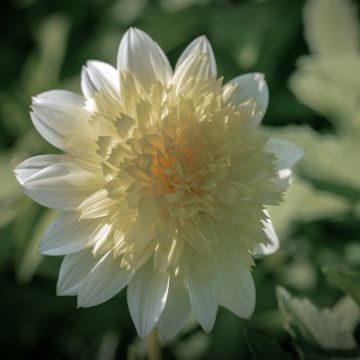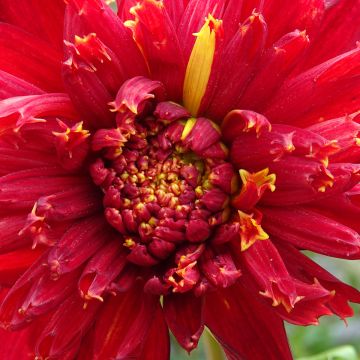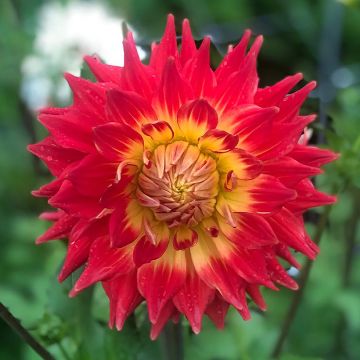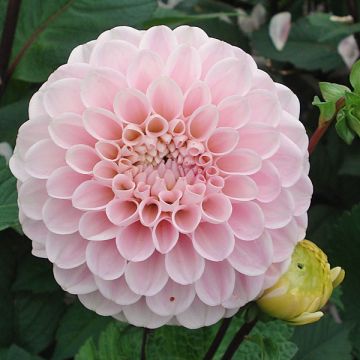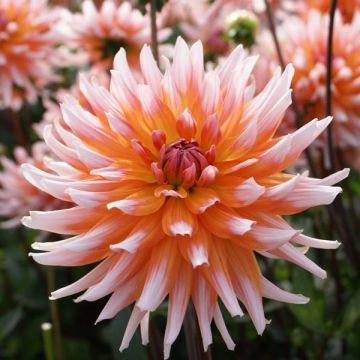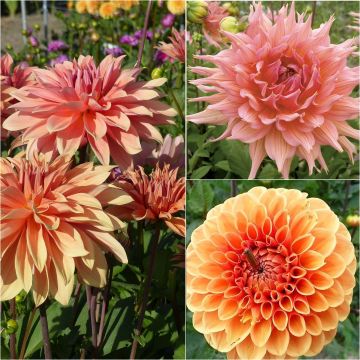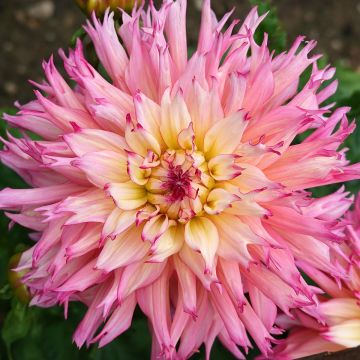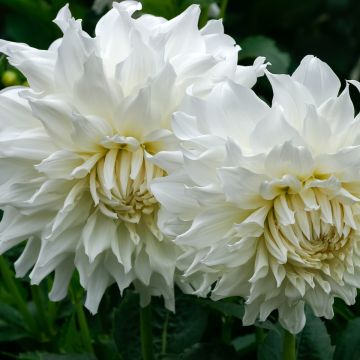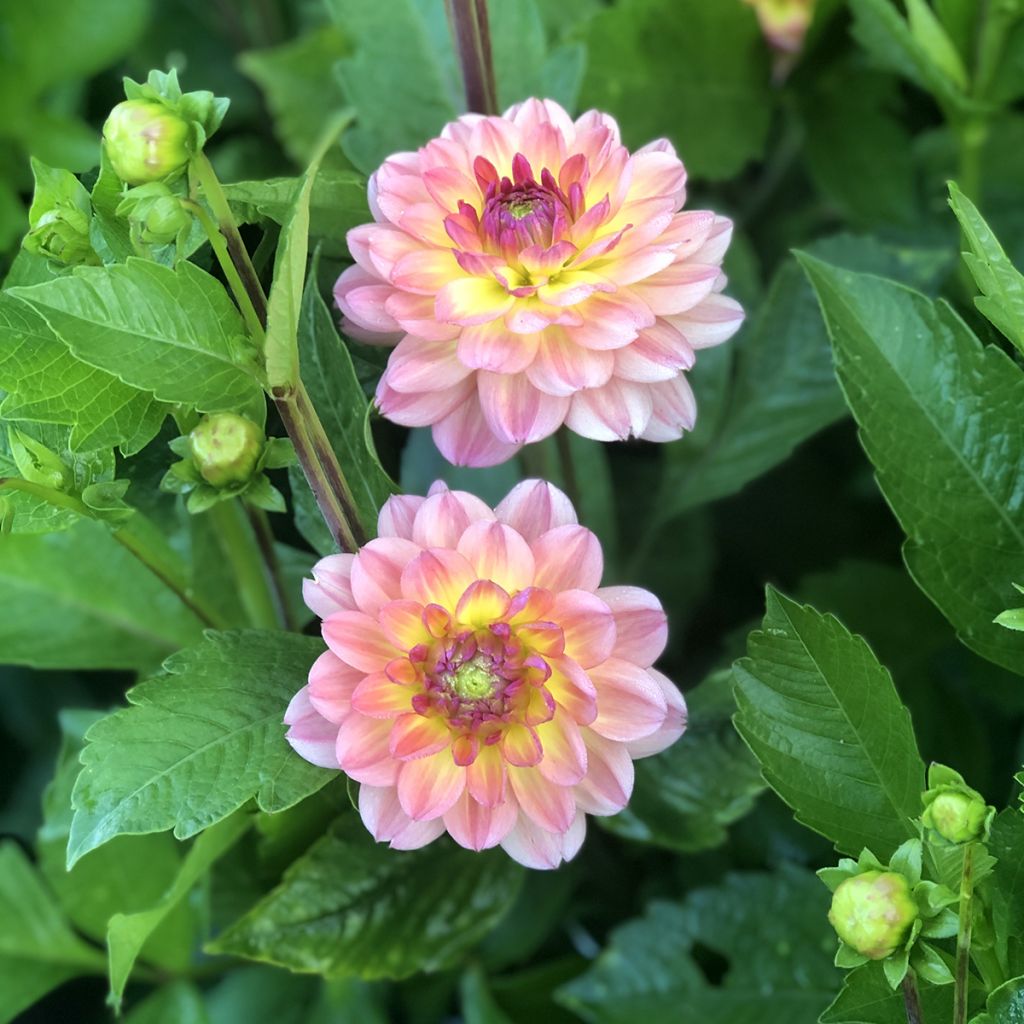

Dahlia décoratif Erna Panzer
Dahlia Erna Panzer
Dahlia Erna Panzer
Dahlia
This item cannot be shipped to the selected country
Delivery charge from €5.90
More information
Schedule delivery date,
and select date in basket
This plant carries a 6 months recovery warranty
More information
We guarantee the quality of our plants for a full growing cycle, and will replace at our expense any plant that fails to recover under normal climatic and planting conditions.
From €5.90 for pickup delivery and €6.90 for home delivery
Express home delivery from €8.90.
Does this plant fit my garden?
Set up your Plantfit profile →
Description
The 'Erna Panzer' Decorative Dahlia is characterized by small but well-formed and beautifully coloured flowers in salmon pink with a yellow and fuchsia centre. This variety develops not very tall, sturdy stems that do not bend under the weight of the flowers and are perfect for making bouquets. It has a plentiful and prolonged flowering period, from July until the first frost, allowing for beautiful combinations in floral arrangements.
Dahlias are tuberous plants from the large aster family and are originally native to the high plateaus of Mexico. Currently, the thousands of horticultural varieties obtained by humans have invaded gardens around the world, much to our delight. Dahlias are classified based on the shape of their flowers. 'Erna Panzer' is classified in the category of Decorative Dahlias. In this group, the coloured ligules of the head are arranged regularly in a spiral, and they can be curved towards the stem or even fringed. In this variety, the heads only measure 8cm (3in) in diameter and their ligules are rather small, oval, concave, and arranged regularly. The flowering period is from July to October-November. The plant will reach about 80cm (32in) in height and 50 to 60cm (20 to 24in) in width, with a bushy and erect habit. The highly branched stems are hollow, and the leaves are opposite, pinnately compound, meaning they are divided into 3 or 5 leaflets, which have very denticulate lobes. The leaves are fairly dark green, and the stems are more or less tinged with purple.
To promote continuous flowering and extend the flowering period, make sure to remove faded flowers. Even better, regularly create attractive colourful bouquets by combining various varieties. Decorative Dahlias pair well with Gauras and Cleomes, which will lighten their generous silhouette. 'Erna Panzer' flowers also make wonderful bouquets with roses and grasses. This medium-sized variety is suitable for the centre of mixed flower beds, to structure a composition of bushy plants and lower-growing plants. The flowering of Echinaceas is perfect to accompany that of Dahlias, as they bloom simultaneously, as do perennial salvias, for example.
As star plants in ornamental gardens, Dahlias are undeniably beautiful flowers. They are perfect in flower beds but can also enhance vegetable gardens. In Mexico, these tuberous plants were initially cultivated as root vegetables for consumption. Their poor taste quickly relegated them to the status of ornamental plants. Since then, the interest in their beautiful exuberance has never waned.
Report an error about the product description
Dahlia Erna Panzer in pictures
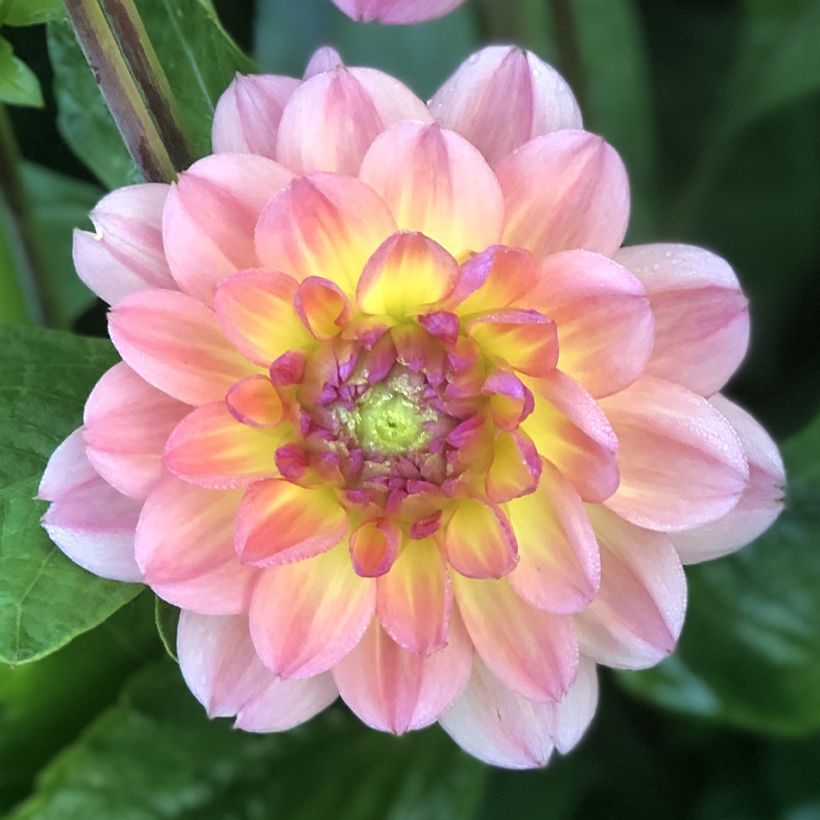

Plant habit
Flowering
Foliage
Botanical data
Dahlia
Erna Panzer
Asteraceae
Dahlia
Cultivar or hybrid
Other Ornamental Dahlias
Planting and care
The Dahlia is easy to grow in all regions. For a generous flowering, it is good to follow a few simple rules, plant the tubers in full sun as soon as the last frost has passed, rich, fresh and well-drained soils are perfect. However, stagnant moisture would promote the rotting of the tubers. Do not hesitate to amend the soil with compost and sand if necessary. Work the soil deeply and enrich it, for example, with crushed horn or dehydrated blood. Place your tuber and crumble the soil well to fill without air pockets. Your dahlia should be covered with about 6cm (2in) of soil. At the end of planting, water once abundantly and then regularly renew this watering during the first 6 weeks to help with rooting.
Dahlias are sensitive to cold, they need to be overwintered. In November, the first frosts blacken the foliage, it is time to remove them. Carefully dig up the tubers. Remove as much soil as possible. Let the foliage dry so that the tubers can replenish their reserves. Then cut the stems to 10cm (4in). Spread your bulbs in a box on newspaper. Store them in a frost-free, dry, cool and dark place, such as a frost-free garage or an attic. In regions in the south, close to the coast, experiencing only a few days of frost per year, it is possible to leave them in place. In this case, simply cover the ground with a layer of leaves or straw for protection.
This tall Dahlia, with its hollow stems, is still sensitive to strong winds or heavy rain. To overcome this inconvenience, you can stake it, but let's agree, it's not very aesthetic. However, by pinching the stems early or removing the axial flower buds, you will spread out the habit of the plant, which will offer more resistance to bad weather. At the same time, you channel the influx of sap to a single flower that will become larger and stronger.
Planting period
Intended location
Care
This item has not been reviewed yet - be the first to leave a review about it.
Dahlias
Haven't found what you were looking for?
Hardiness is the lowest winter temperature a plant can endure without suffering serious damage or even dying. However, hardiness is affected by location (a sheltered area, such as a patio), protection (winter cover) and soil type (hardiness is improved by well-drained soil).

Photo Sharing Terms & Conditions
In order to encourage gardeners to interact and share their experiences, Promesse de fleurs offers various media enabling content to be uploaded onto its Site - in particular via the ‘Photo sharing’ module.
The User agrees to refrain from:
- Posting any content that is illegal, prejudicial, insulting, racist, inciteful to hatred, revisionist, contrary to public decency, that infringes on privacy or on the privacy rights of third parties, in particular the publicity rights of persons and goods, intellectual property rights, or the right to privacy.
- Submitting content on behalf of a third party;
- Impersonate the identity of a third party and/or publish any personal information about a third party;
In general, the User undertakes to refrain from any unethical behaviour.
All Content (in particular text, comments, files, images, photos, videos, creative works, etc.), which may be subject to property or intellectual property rights, image or other private rights, shall remain the property of the User, subject to the limited rights granted by the terms of the licence granted by Promesse de fleurs as stated below. Users are at liberty to publish or not to publish such Content on the Site, notably via the ‘Photo Sharing’ facility, and accept that this Content shall be made public and freely accessible, notably on the Internet.
Users further acknowledge, undertake to have ,and guarantee that they hold all necessary rights and permissions to publish such material on the Site, in particular with regard to the legislation in force pertaining to any privacy, property, intellectual property, image, or contractual rights, or rights of any other nature. By publishing such Content on the Site, Users acknowledge accepting full liability as publishers of the Content within the meaning of the law, and grant Promesse de fleurs, free of charge, an inclusive, worldwide licence for the said Content for the entire duration of its publication, including all reproduction, representation, up/downloading, displaying, performing, transmission, and storage rights.
Users also grant permission for their name to be linked to the Content and accept that this link may not always be made available.
By engaging in posting material, Users consent to their Content becoming automatically accessible on the Internet, in particular on other sites and/or blogs and/or web pages of the Promesse de fleurs site, including in particular social pages and the Promesse de fleurs catalogue.
Users may secure the removal of entrusted content free of charge by issuing a simple request via our contact form.
The flowering period indicated on our website applies to countries and regions located in USDA zone 8 (France, the United Kingdom, Ireland, the Netherlands, etc.)
It will vary according to where you live:
- In zones 9 to 10 (Italy, Spain, Greece, etc.), flowering will occur about 2 to 4 weeks earlier.
- In zones 6 to 7 (Germany, Poland, Slovenia, and lower mountainous regions), flowering will be delayed by 2 to 3 weeks.
- In zone 5 (Central Europe, Scandinavia), blooming will be delayed by 3 to 5 weeks.
In temperate climates, pruning of spring-flowering shrubs (forsythia, spireas, etc.) should be done just after flowering.
Pruning of summer-flowering shrubs (Indian Lilac, Perovskia, etc.) can be done in winter or spring.
In cold regions as well as with frost-sensitive plants, avoid pruning too early when severe frosts may still occur.
The planting period indicated on our website applies to countries and regions located in USDA zone 8 (France, United Kingdom, Ireland, Netherlands).
It will vary according to where you live:
- In Mediterranean zones (Marseille, Madrid, Milan, etc.), autumn and winter are the best planting periods.
- In continental zones (Strasbourg, Munich, Vienna, etc.), delay planting by 2 to 3 weeks in spring and bring it forward by 2 to 4 weeks in autumn.
- In mountainous regions (the Alps, Pyrenees, Carpathians, etc.), it is best to plant in late spring (May-June) or late summer (August-September).
The harvesting period indicated on our website applies to countries and regions in USDA zone 8 (France, England, Ireland, the Netherlands).
In colder areas (Scandinavia, Poland, Austria...) fruit and vegetable harvests are likely to be delayed by 3-4 weeks.
In warmer areas (Italy, Spain, Greece, etc.), harvesting will probably take place earlier, depending on weather conditions.
The sowing periods indicated on our website apply to countries and regions within USDA Zone 8 (France, UK, Ireland, Netherlands).
In colder areas (Scandinavia, Poland, Austria...), delay any outdoor sowing by 3-4 weeks, or sow under glass.
In warmer climes (Italy, Spain, Greece, etc.), bring outdoor sowing forward by a few weeks.

































